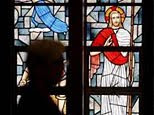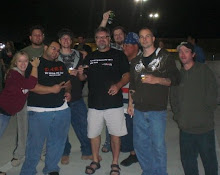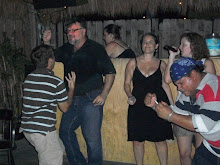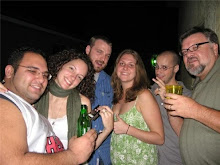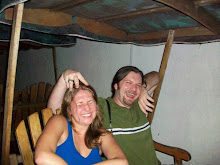(Henri Nouwen) When we claim our own poverty and connect our poverty with the poverty of our brothers and sisters, we become the Church of the poor, which is the Church of Jesus. Solidarity is essential for the Church of the poor . Both pain and joy must be shared. As one body we will experience deeply one another's agonies as well as one another's ecstasies. As Paul says: "If one part is hurt, all the parts share its pain. And if one part is honored, all the parts share its joy" (1 Corinthians 12:26).
Often we might prefer not to be part of the body because it makes us feel the pain of others so intensely. Every time we love others deeply we feel their pain deeply. However, joy is hidden in the pain. When we share the pain we also will share the joy.
Tuesday, November 3, 2009
Thursday, October 29, 2009
Tuesday, October 27, 2009
The Authority of Compassion
The Church often wounds us deeply. People with religious authority often wound us by their words, attitudes, and demands. Precisely because our religion brings us in touch with the questions of life and death, our religious sensibilities can get hurt most easily. Ministers and priests seldom fully realize how a critical remark, a gesture of rejection, or an act of impatience can be remembered for life by those to whom it is directed.
There is such an enormous hunger for meaning in life, for comfort and consolation, for forgiveness and reconciliation, for restoration and healing, that anyone who has any authority in the Church should constantly be reminded that the best word to characterize religious authority is compassion. Let's keep looking at Jesus whose authority was expressed in compassion.
There is such an enormous hunger for meaning in life, for comfort and consolation, for forgiveness and reconciliation, for restoration and healing, that anyone who has any authority in the Church should constantly be reminded that the best word to characterize religious authority is compassion. Let's keep looking at Jesus whose authority was expressed in compassion.
Sunday, October 18, 2009
Love Your Enemies
Matthew 5:38-48
38-42"Here's another old saying that deserves a second look: 'Eye for eye, tooth for tooth.' Is that going to get us anywhere? Here's what I propose: 'Don't hit back at all.' If someone strikes you, stand there and take it. If someone drags you into court and sues for the shirt off your back, giftwrap your best coat and make a present of it. And if someone takes unfair advantage of you, use the occasion to practice the servant life. No more tit-for-tat stuff. Live generously.
43-47"You're familiar with the old written law, 'Love your friend,' and its unwritten companion, 'Hate your enemy.' I'm challenging that. I'm telling you to love your enemies. Let them bring out the best in you, not the worst. When someone gives you a hard time, respond with the energies of prayer, for then you are working out of your true selves, your God-created selves. This is what God does. He gives his best—the sun to warm and the rain to nourish—to everyone, regardless: the good and bad, the nice and nasty. If all you do is love the lovable, do you expect a bonus? Anybody can do that. If you simply say hello to those who greet you, do you expect a medal? Any run-of-the-mill sinner does that.
48"In a word, what I'm saying is, Grow up. You're kingdom subjects. Now live like it. Live out your God-created identity. Live generously and graciously toward others, the way God lives toward you."
38-42"Here's another old saying that deserves a second look: 'Eye for eye, tooth for tooth.' Is that going to get us anywhere? Here's what I propose: 'Don't hit back at all.' If someone strikes you, stand there and take it. If someone drags you into court and sues for the shirt off your back, giftwrap your best coat and make a present of it. And if someone takes unfair advantage of you, use the occasion to practice the servant life. No more tit-for-tat stuff. Live generously.
43-47"You're familiar with the old written law, 'Love your friend,' and its unwritten companion, 'Hate your enemy.' I'm challenging that. I'm telling you to love your enemies. Let them bring out the best in you, not the worst. When someone gives you a hard time, respond with the energies of prayer, for then you are working out of your true selves, your God-created selves. This is what God does. He gives his best—the sun to warm and the rain to nourish—to everyone, regardless: the good and bad, the nice and nasty. If all you do is love the lovable, do you expect a bonus? Anybody can do that. If you simply say hello to those who greet you, do you expect a medal? Any run-of-the-mill sinner does that.
48"In a word, what I'm saying is, Grow up. You're kingdom subjects. Now live like it. Live out your God-created identity. Live generously and graciously toward others, the way God lives toward you."
Labels:
Commands of Christ,
forgiveness,
love for enemies
Friday, October 16, 2009
Called out of Slavery - Henri Nouwen
The Church is the people of God. The Latin word for "church," ecclesia, comes from the Greek ek, which means "out," and kaleo, which means "to call." The Church is the people of God called out of slavery to freedom, sin to salvation, despair to hope, darkness to light, an existence centered on death to an existence focused on life.
Sunday, October 11, 2009
Monday, October 5, 2009
God will Speak.
Mother Teresa: October 6 - Humility and prayer--which will lead us to holiness--grow from a heart, mind, and tongue that live in silence with God. In that silence of the heart, God will Speak.
Jesus asked his diciples to learn from him for he was meek and humble of heart, WE, too, must be meek with one another and then we will be all right with God. Humble with him, proving our lovef in wholehearted service.
Jesus asked his diciples to learn from him for he was meek and humble of heart, WE, too, must be meek with one another and then we will be all right with God. Humble with him, proving our lovef in wholehearted service.
Friday, October 2, 2009
The Most Human and Most Divine Gesture

The two disciples whom Jesus joined on the road to Emmaus recognised him in the breaking of the bread. What is a more common, ordinary gesture than breaking bread? It may be the most human of all human gestures: a gesture of hospitality, friendship, care, and the desire to be together. Taking a loaf of bread, blessing it, breaking it, and giving it to those seated around the table signifies unity, community, and peace. When Jesus does this he does the most ordinary as well as the most extraordinary. It is the most human as well as the most divine gesture.
The great mystery is that this daily and most human gesture is the way we recognise the presence of Christ among us. God becomes most present when we are most human.
________________________________________
These reflections are taken from Henri J.M. Nouwen's Bread for the Journey.
John 6:51 - "I am the living Bread"
Monday, September 28, 2009
Mother Teresa daily devotional
September 28, 2009
I can understand the greatness of God but I cannot understand his humility. It becomes so clear in him being in love with each one of us separately and completely. It is as if there is one but me in the world. He loves me so much. Each one of us can say this with great conviction. ~ Mother Teresa, “Thirsting for God” 2000: p. 145.
I can understand the greatness of God but I cannot understand his humility. It becomes so clear in him being in love with each one of us separately and completely. It is as if there is one but me in the world. He loves me so much. Each one of us can say this with great conviction. ~ Mother Teresa, “Thirsting for God” 2000: p. 145.
Thursday, September 17, 2009
Saturday, September 12, 2009
Turn, turn, turn, there is a time for everthing
one of my favorites sons in 1970 was Turn, Turn, turn by the birds, taken from Ecclesestes and released in October, 1965. The basic message of Ecclesastes is that life sucks, there is real point to anything, the only that matters is to love your companion, and enjoy your work for its on sake, not as a means to an end. Perhaps we can discuss this topic on Sunday and Tuesday ... the skeptics and agnostics will love it, heck, I love and I am only a cynic!
Here is a quote from chapter 1:
Ecclesiastes 1 (The Message)
These are the words of the Quester, David's son and king in Jerusalem 2-11 Smoke, nothing but smoke. [That's what the Quester says.] There's nothing to anything—it's all smoke.
What's there to show for a lifetime of work,
a lifetime of working your fingers to the bone?
One generation goes its way, the next one arrives,
but nothing changes—it's business as usual for old planet earth.
There's an opportune time to do things, a right time for everything on the earth:
2-8 A right time for birth and another for death,
A right time to plant and another to reap,
A right time to kill and another to heal,
A right time to destroy and another to construct,
A right time to cry and another to laugh,
A right time to lament and another to cheer,
A right time to make love and another to abstain,
A right time to embrace and another to part,
A right time to search and another to count your losses,
A right time to hold on and another to let go,
A right time to rip out and another to mend,
A right time to shut up and another to speak up,
A right time to love and another to hate,
A right time to wage war and another to make peace.
9-13 But in the end, does it really make a difference what anyone does?
Here is a quote from chapter 1:
Ecclesiastes 1 (The Message)
These are the words of the Quester, David's son and king in Jerusalem 2-11 Smoke, nothing but smoke. [That's what the Quester says.] There's nothing to anything—it's all smoke.
What's there to show for a lifetime of work,
a lifetime of working your fingers to the bone?
One generation goes its way, the next one arrives,
but nothing changes—it's business as usual for old planet earth.
There's an opportune time to do things, a right time for everything on the earth:
2-8 A right time for birth and another for death,
A right time to plant and another to reap,
A right time to kill and another to heal,
A right time to destroy and another to construct,
A right time to cry and another to laugh,
A right time to lament and another to cheer,
A right time to make love and another to abstain,
A right time to embrace and another to part,
A right time to search and another to count your losses,
A right time to hold on and another to let go,
A right time to rip out and another to mend,
A right time to shut up and another to speak up,
A right time to love and another to hate,
A right time to wage war and another to make peace.
9-13 But in the end, does it really make a difference what anyone does?
Monday, September 7, 2009
Topics for discussion and thoughtful reading
Lectionary Readings from the Anglican Book of Common Prayer
Proverbs 1:20-33
Ps 41, 52 * 44; 1 Kings 13:1-10; Philippians 1:1-11
Mark 15:40-47. ...waiting expectantly for the kingdom of God.
Commentary on Anglican lectionary readings
Daily Meditation from Henri Nouwen:
Living in the End-Time
We are living in the end-time! This does not mean that creation will soon come to its end, but it does mean that all the signs of the end of time that Jesus mentions are already with us: wars and revolutions, conflicts between nations and between kingdoms, earthquakes, plagues, famines, and persecutions (see Luke 21:9-12). Jesus describes the events of our world as announcements that this world is not our final dwelling place, but that the Son of Man will come to bring us our full freedom. "When these things begin to take place," Jesus says, "stand erect, hold your heads high, because your liberation is near at hand" (Luke 21:28). The terrible events surrounding us must be lived as ways to make us ready for our final liberation.
Proverbs 1:20-33
Ps 41, 52 * 44; 1 Kings 13:1-10; Philippians 1:1-11
Mark 15:40-47. ...waiting expectantly for the kingdom of God.
Commentary on Anglican lectionary readings
Daily Meditation from Henri Nouwen:
Living in the End-Time
We are living in the end-time! This does not mean that creation will soon come to its end, but it does mean that all the signs of the end of time that Jesus mentions are already with us: wars and revolutions, conflicts between nations and between kingdoms, earthquakes, plagues, famines, and persecutions (see Luke 21:9-12). Jesus describes the events of our world as announcements that this world is not our final dwelling place, but that the Son of Man will come to bring us our full freedom. "When these things begin to take place," Jesus says, "stand erect, hold your heads high, because your liberation is near at hand" (Luke 21:28). The terrible events surrounding us must be lived as ways to make us ready for our final liberation.
Thursday, March 19, 2009
Healing the blind -- and blinding the seeing
check this out ... what do you think Jesus means when he says "I have come to give sight to the blind and to take away sight from those who see"?
Subscribe to:
Posts (Atom)

